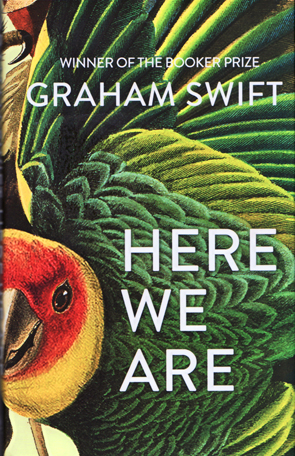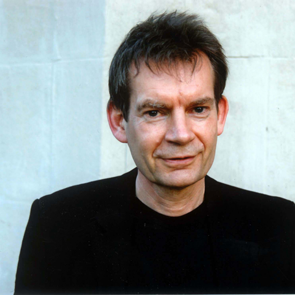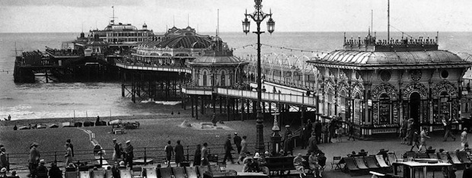Magic and illusion provide the central metaphor in Graham Swift’s latest novel, Here we Are. Set over the course of half a century, the novel explores the life of Ronnie Deane, a boy sent from London during the Blitz as an evacuee to live with Eric and Penelope Lawrence outside Oxford. Ronnie is inspired to become a magician by Eric, himself a magician performing as Lorenzo. Their house, Evergrene, is a magical place where Ronnie hopes to stay permanently. For Ronnie, the Lawrences become more of a father and mother to him than his own parents. Ronnie’s father, Sid, a merchant shipman, is hardly ever home. His mother, Agnes, and the life she has to offer Ronnie, seem inadequate when he is forced to return home after the war. Ronnie feels estranged from his mother. His enduring memory of her is the day she sent him away on the train to live in Evergrene with the Lawrences. And while that was a positive experience, her actions seem like a betrayal. Like an exotic parrot his father bought him, he has been gotten rid of. Ronnie had been forced to support his mother’s lie, that the bird flew away. The truth is, Agnes sold it for money.
Here we Are is also the story of Jack Robbins and Evie White. Having formed a friendship with Jack during their National Service, Ronnie is given an opportunity to perform magic on stage at Brighton Pier where Jack comperes a variety show. Jack suggests to Ronnie that he advertise for an assistant. When Ronnie hires Evie, he gets more than he anticipated. Not only is Evie a great stage presence in her alluring costume, but she also becomes his lover. And during the Summer of 1959 their act becomes the main attraction at the pier.
Here we Are is one of those rare books that seem like a quick simple read – I read it in an afternoon – yet resonate with meaning after it is finished. Immediately, there is a sense of the significance of presences and absences in the novel. The title, itself, suggests this. A favoured phrase of Penelope Lawrence - Here we are
- becomes a happy memory for Ronnie, said whenever she proffers drinks or gives a friendly greeting. But like other minor aspects of the story, the repetition of the phrase or its variants suggests a kind of declension of meanings, beginning with Penelope’s warm greeting, to next suggest the situation in which one finds oneself, or to the roles one plays in life, as in on a stage, or to the problem of identity and essence; the very nature of the self.
Linked to this is the idea of stage and performance, of magic and illusion. In one instant, Jack is plain old Jack Robbins and in the next, as he steps on stage, he is Jack Robinson, as in ‘before you can say…’. At one moment, Ronnie and Evie are plain old Ronnie Deane and Evie White, but in the next when they step on stage, they become Pablo and Eve, both exotic and archetypal. The stage is life writ large, as in Jacques’s monologue in Shakespeare’s As You Like It. It is where the self might be reinvented in an instant, as one might strive to invent oneself in reality. Ronnie is reinvented during his stay at Evergrene. The childless Lawrences are able to reinvent their life when Ronnie arrives. But Agnes, Ronnie’s mother, is incapable of change except through death. And death is the ultimate reinvention, the self both physically present, but essentially absent: the ultimate disappearing trick.
Absences shape the life experience of these characters: from Ronnie’s absent parents to his and Jack’s absence from Evie later in her life. When she walks into a spider’s web a year after the death of her husband, Evie’s mind is returned to one of her and Ronnie’s signature moments in their performance, in which a rope from Ronnie’s mouth was extended across the stage, like an enormous skipping rope
, just before the appearance of a rainbow and the escape of a dove. Not even Evie is sure how Ronnie performed some of these illusions. Later in life, when asked to cooperate in the writing of a biography of Jack by his agent, Evie wishes to revive the memory of Ronnie, instead, for it is the mystery and secrets of an individual that ultimately prove more interesting than what can be known.
This is a novel that has the alluring, bitter sweetness of the past. Brighton Pier in the Summer of 1959 occupies a place in time: a moment when Pablo and Eve’s magic show is ripe, when Brighton Beach is a popular holiday destination and magic and illusion is still desired by a post-war public. Yet it is a fading time, seen from the perspective of Evie’s older self. She understands that their success would soon have faded as society, itself changed. It was in that moment before the 1960s swept away the naiveite of that period that Ronnie and Evie’s show could exist: a time when a boy from a working-class family could reinvent himself as the ‘Great Pablo’; not a quotidian dove, the staple reveal of any magic act, but an exotic parrot.

 RSS Feed
RSS Feed Facebook
Facebook Instagram
Instagram YouTube
YouTube Subscribe to our Newsletter
Subscribe to our Newsletter





No one has commented yet. Be the first!